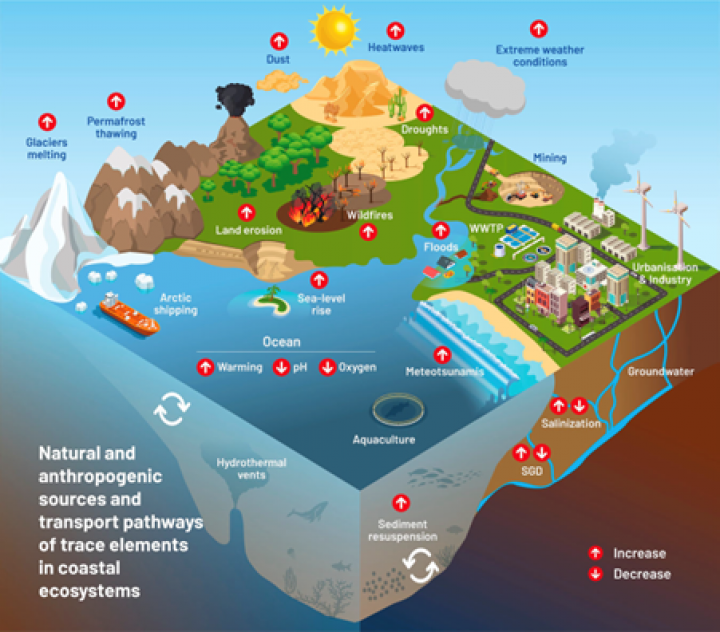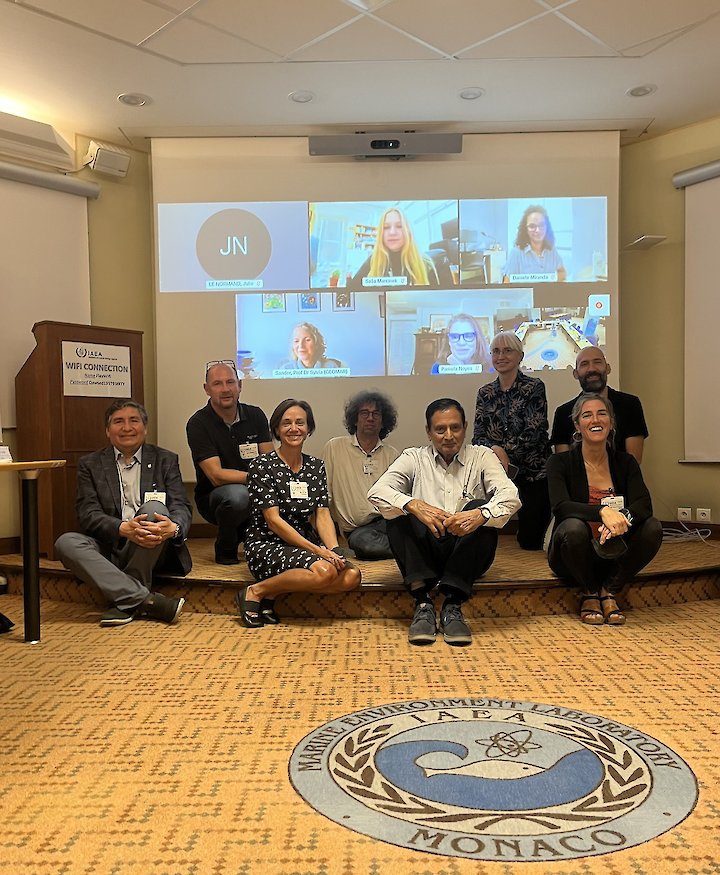Lead agency: International Atomic Energy Agency (IAEA).
Sponsoring Agencies: UN Environmental Programme (UNEP), Intergovernmental Oceanographic Commission (IOC-UNESCO), World Meteorological Organization (WMO), International Maritime Organization (IMO).
Overview
The overall aim of Working Group 45 is to better understand the various ways that climate change may impact and interact with ocean contaminants, including pollutants, and to assess the scope of the potential consequences this may have. WG 45 is a multidisciplinary group of experts whose work so far has involved systematically reviewing the current scientific knowledge of this topic and identifying remaining knowledge gaps. Once published, work will aid stakeholders and decision-makers in making informed choices on the topics of climate change and ocean pollution.
Background
Contamination broadly refers to the presence of impurities where they would not be expected to exist. Ocean contamination may happen as a result of human activity or be naturally occurring. Within the umbrella term of contamination, pollution is definitively the result of human activity and has adverse effects on humans, other species and/or the environment. Contaminants and/or pollutants include metals, nutrients, organic compounds, plastics and radioactive particles (known as radionuclides). WG 45 investigates the impacts that climate change has on both ocean contaminants and pollutants.
Climate change stressors are conditions (e.g., increased global temperature, increased carbon dioxide in the atmosphere) that make climate change hazards (e.g., storms, rising sea levels, ocean acidification) worse. Recent studies have shown that stressors not only present threats on their own but are also part of a network of interdependent components of the Earth’s systems. Therefore, changes in one stressor are likely to have complex and widespread consequences through their interactions with other stressors.
Conceptual diagram of the natural and anthropogenic sources, sinks, and transport pathways of trace element contaminants in coastal ecosystems, which may interact with climate change (CC) drivers. The red arrows indicate the expected directions of changes
For example, climate change exacerbates the following factors related to contaminants/pollutants in the world’s oceans:
- Speciation – the chemical form and oxidation state of a contaminant/pollutant in response to environmental factors such as temperature, pH etc.
- Bioavailability – the amount of substance available in the environment for organisms to uptake.
- Bioaccumulation – the amount of substance that has become concentrated within the bodies of living organisms.
- Toxicity – the degree to which a substance is poisonous or harmful to living things.
These may go on to negatively affect coastal and ocean ecosystem function, thereby compromising ocean ecosystem sustainability as well as food security for human communities that rely on seafood. Therefore, climate change impacts present not only a major threat to the environment, but also to political and socioeconomic stability as well as to human health.
However, there is currently no mechanistic understanding of how climate change and ocean contaminants/pollutants interact, therefore it is difficult to make predictions about the risks they pose to the environment and to human societies. As such, WG 45 was created to systematically review the existing literature on this topic.
History and work of WG 45
WG 45 was created formed in 2020 to aid in achieving several of the UN’s Sustainable Development Goals on the 2030 agenda:
- SDG 14 – Life below water
- SDG 2 – Zero hunger
- SDG 6 – Clean water and sanitation
- SDG 13 – Climate action
This is also against the backdrop of the UN Decade of Ocean Science for Sustainable Development, aiming to protect a clean, healthy, productive, resilient and predictable ocean.
Please find WG 45’s Terms of Reference on page 83 of GESAMP’s 50th Session Report.
WG 45 held their first meeting virtually in July 2021. Here, they deliberated on the working plan and initial priority topics to be investigated. Discussions covered the following topics:
- The potential impacts that climate change has on contaminants in the ocean (regarding fate, toxicity, speciation and bioaccumulation of contaminants).
- The impacts that the ocean warming, acidification and deoxygenation have on contaminants in the ocean (regarding speciation, bioavailability, bioaccumulation, toxicity and transport of contaminants).
- The impacts that extreme events and sea-level rise have on contaminants in the ocean (regarding remobilization and transport of pollutants).
This created a roadmap for future work necessary. For example, a perspective manuscript (Zitoun R, Marcinek S, Hatje V, Sander SG, Völker C, Sarin M, Omanović D. (2024) ‘Climate change driven effects on transport, fate and biogeochemistry of trace element contaminants in coastal marine ecosystems’ Communications Earth & Environment | (2024)5:560. https://doi.org/10.1038/s43247-024-01679-y2022 ), systematic reviews (Gwynn, J. P., Hatje, V., Casacuberta, N., Sarin, M., & Osvath, I. (2024). The effect of climate change on sources of radionuclides to the marine environment. Communications Earth & Environment, 5(1), Article 135. https://doi.org/10.1038/s43247-024-01241-w and Richardson C,Peucker-Ehrenbrink B,Wyatt S, BourbonnaisA, HatjeV, Frey C, Sanders T, Varela D E, Paytan A (2025) ‘Effects of climate change on river and groundwater nutrient inputs to the coastal ocean’ Communications Earth & Environment), lab and field experiments and future scenario modelling.
The group highlighted the need to consider a holistic approach by integrating natural and social sciences, and the need for additional members to provide expertise on potential socio-economic impact assessments.
WG 45’s first in-person meeting was hosted by the International Atomic Energy Agency in Monaco, 28-30 October 2022 and second meeting was hosted by IOC-UNESCO in Paris, 27-30 November 2023.
Current and future work of WG 45
The discussion held in WG meetings are currently synthesized for publication in the peer-reviewed scientific literature journals.
- Hatje V, Sarin M, Sander SG, Omanovic D, Ramachandran P, Volker C, Barra RO, Tagliabue O. (2022) ‘Emergent interactive effects of climate change and contaminants in coastal and ocean ecosystems’. Front. Mar. Sci. 9:936109. https://doi.org/10.3389/fmars.2022.936109
- Zitoun R, Marcinek S, Hatje V, Sander SG, Völker C, Sarin M, Omanović D. (2024) ‘Climate change driven effects on transport, fate and biogeochemistry of trace element contaminants in coastal marine ecosystems’. Communications Earth & Environment | (2024)5:560. https://doi.org/10.1038/s43247-024-01679-y
- Gwynn, J. P., Hatje, V., Casacuberta, N., Sarin, M., & Osvath, I. (2024). ‘The effect of climate change on sources of radionuclides to the marine environment’. Communications Earth & Environment, (2024)5:135. https://doi.org/10.1038/s43247-024-01241-w
- Richardson C,Peucker-Ehrenbrink B, Wyatt S, BourbonnaisA, HatjeV, Frey C, Sanders T, Varela D E, Paytan A (2025) ‘Effects of climate change on river and groundwater nutrient inputs to the coastal ocean’ Communications Earth & Environment (under review revised submitted).
- ‘Climate change and persistent organic pollutants (POPs) in the marine environment: A systematic review of multiple stressors.’ Communications Earth & Environment (2025) (under revision)
Current members of WG 45
Co-chairs: Vanessa Hatje (Brazil) (until January 2024) and Manmohan Sarin (India)and Dario Omanovic (Croatia)
Elisabeth Holland (Fiji), Sylvia Sander (Germany), P Nuria Casacuberta (Switzerland), Ricardo Barra (Chile), Dario Omanovic (Croatia), Alessandro Tagliabue (United Kingdom), Christoph Voelker (Germany), Justin Gwynn (Norway), Pamela Noyes (United States).
Members of WG 45 at their first in-person meeting hosted by IAEA in Monaco, 28-30 October 2022
Page last updated: 16 May 2025

